Related Research Articles

Tryavna is a town in central Bulgaria, situated in the northern slopes of the Balkan range, on the Tryavna river valley, near Gabrovo. It is famous for its textile industry and typical National Revival architecture, featuring 140 cultural monuments, must, and expositions. Tryavna is the birthplace of Bulgarian writer Pencho Slaveykov and revolutionary Angel Kanchev.

PFC Levski Sofia is a Bulgarian professional association football club based in Sofia, which competes in the First League, the top division of the Bulgarian football league system. The club was founded on 24 May 1914 by a group of high school students, and is named after Vasil Levski, a Bulgarian revolutionary renowned as the national hero of the country.

The Bulgarian Revival, sometimes called the Bulgarian National Revival, was a period of socio-economic development and national integration among Bulgarian people under Ottoman rule. It is commonly accepted to have started with the historical book, Istoriya Slavyanobolgarskaya, written in 1762 by Paisius, a Bulgarian monk of the Hilandar monastery at Mount Athos, leading to the National awakening of Bulgaria and the modern Bulgarian nationalism, and lasting until the Liberation of Bulgaria in 1878 as a result of the Russo-Turkish War of 1877–1878.

Radomir is a town in the Radomir Municipality in the Pernik Province of Bulgaria.
Byala Cherkva is a town in Pavlikeni Municipality, Veliko Turnovo Province, Central-North Bulgaria. The settlement is located close to the town of Pavlikeni about 28 km away from the city of Veliko Tarnovo. Its name in Bulgarian means white church, a popular placename around the world, equivalent to Bela Crkva, Weisskirchen, Whitechurch, etc. As of December 2009, the town had a population of 2,612.
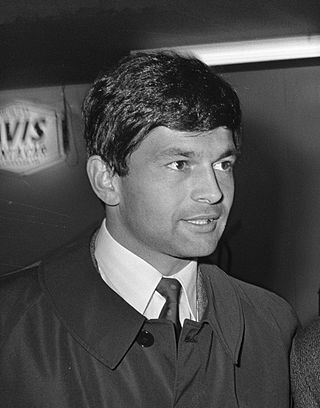
Georgi Asparuhov Rangelov, nicknamed Gundi, was a Bulgarian footballer who played as a striker.
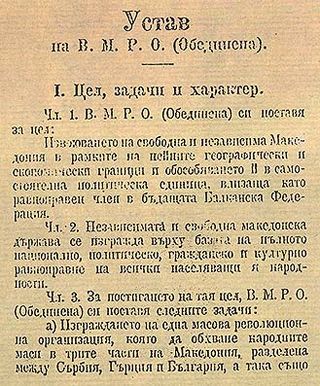
The Internal Macedonian Revolutionary Organization (United) (1925–1936) commonly known in English as IMRO (United), was the name of a revolutionary political organization active across the entire geographical region of Macedonia.

The Bulgarian Agrarian National Union, is a political party devoted to representing the causes of the Bulgarian peasantry. It was an agrarian movement and was most powerful between 1900 and 1923. Unlike the socialist movements of the early 20th century, it was devoted to questions concerning agriculture and farmers, rather than industry and factory workers. The BZNS, one of the first and most powerful of the agrarian parties in Eastern Europe, dominated Bulgarian politics during the beginning of the 20th century. It is also the only agrarian party in Europe that ever came to power with a majority government, rather than merely as part of a coalition. It is a founding member of the former International Agrarian Bureau.

Georgi Pulevski, sometimes also Gjorgji, Gjorgjija Pulevski or Đorđe Puljevski was a Mijak writer and revolutionary.
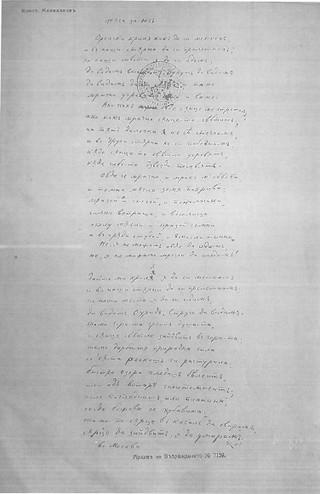
Taga za Yug was a poem by the Bulgarian National Revival poet Konstantin Miladinov. It is a patriotic-reflexive song in which the author, who lives in Moscow, expresses his homesickness for his homeland. By the end of the 1850s, Bulgarian poets as Miladinov started to write lyric poetry in vernacular. This poem was written in the Struga dialect.

The Bulgarian name system has considerable similarities with most other European name systems, and with those of other Slavic peoples such as the Russian name system, although it has certain unique features.
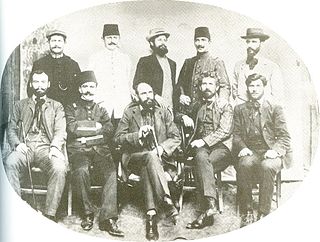
The People's Federative Party (Bulgarian Section)(Bulgarian: Народна федеративна партия (българска секция)v) or just People's Federative Party was a Bulgarian political party in the Ottoman Empire, created after the Young Turk Revolution, by members of the left wing of the Internal Macedonian Adrianople Revolutionary Organization (IMARO). The party functioned for one year from August 1909 until August 1910. The Party decided to name itself Bulgarian Section, since it was hoped that other nationalities from European Turkey would adopt its program and form their own ethnic sections, but this didn't happen. Its main political rival was the Union of the Bulgarian Constitutional Clubs.
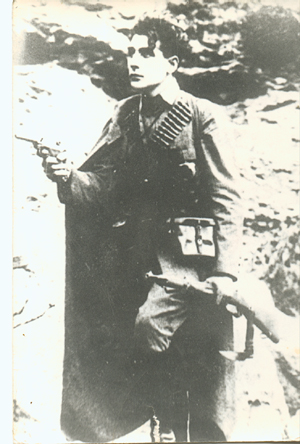
Tinko Simov was a Bulgarian revolutionary from Balgarene, Lovech Province. Georgi Balkanski called him the Bulgarian anarchist revolutionary who fought in secrecy for the longest time. He was a part of a number of anarchists groups and was a founder of the anarchist guerrilla group, Guéroïa. Among his most frequent collaborators were Vasil Popov, Georges Popov, Vassil Ikonomov, and Georges Cheïtanov. He also wrote poetry, for example his poem about the revolutionary struggle, Не беснейте властелини.

Rayko Ivanov Daskalov was a Bulgarian interwar politician of the Bulgarian Agrarian National Union (BANU). One of the chief leaders of the republican Vladaya Uprising organised by deserted Bulgarian Army troops in 1918 against the government, from 1919 to 1923 Daskalov was a prominent member of the BAPU governments which were in power in Bulgaria in the early post-World War I period.

Reyan Daskalov is a Bulgarian professional footballer who plays as a defender or midfielder for CSKA 1948.
Daskalov is a surname. Notable people with the surname include:
The People's Court was a special court of Communist Bulgaria, set up outside the operations of the constitutional frame of law. The court was established after the Bulgarian coup d'état of 1944.

Teodosi Petrov Daskalov was a Bulgarian infantry general who served as Minister of War from January 24, 1938, to April 11, 1942. He was executed by the communist regime on February 1, 1945, after a death sentence issued by the so-called People's Court.
References
- ↑ "Georgi Daskalov Facts". Footballdatabase.eu.
